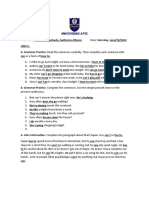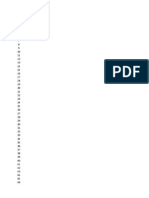Uiio
Uiio
Uploaded by
HiiCopyright:
Available Formats
Uiio
Uiio
Uploaded by
HiiCopyright
Available Formats
Share this document
Did you find this document useful?
Is this content inappropriate?
Copyright:
Available Formats
Uiio
Uiio
Uploaded by
HiiCopyright:
Available Formats
A full timetable
present simple passive / present simple for
timetables
Josef was a tourist on holiday in London. He wanted to visit the Tower of London,
Buckingham Palace and all the other famous tourist attractions. He arrived at the
hotel and went to the front desk to check in.
‘Good evening, sir,’ said the woman at the reception desk, ‘How may I help you?’
‘Good evening. I have a reservation for three nights full board. I booked online. The
name is Josef Kurstall.’
‘Ah, yes, Mr. Kurstall. I have your booking here on the computer. Welcome to our
hotel. Now first let me explain the hotel restaurant meal times. Breakfast is
served from seven until eleven o’clock in the morning. Lunch is served
from midday to three in the afternoon and dinner is served from six o’clock until
nine.’
The receptionist noticed that Josef looked worried about something.
‘I hope there is no difficulty about that, sir. Is there a problem?’ she asked.
‘Well, it seems like a nice hotel, and I’m sure the food is very good,’ said Josef,
frowning, ‘But when am I going to have time to go sightseeing?’
Grammar: present simple for timetables
It’s possible to use the present simple to refer to the future when you are talking
about timetables and programmes of events.
The train leaves at 11.28 tomorrow morning.
The race begins in ten minutes.
You can also use the present simple to talk about future arrangements when the
plans are fixed in a timetable.
When do you start your new course?
I finish work at seven o’clock tonight.
The present continuous form has a different use for future meaning. The present
continuous is used for personal plans written in a diary. Compare these sentences.
What time does the plane arrive tomorrow? ( a fixed timetable)
What time is she arriving tomorrow? ( a diary arrangement)
The play starts at eight o’clock. ( a fixed timetable)
We’re going to the theatre this evening. ( a diary arrangement)
Choose the better form to complete these sentences, present simple or
present continuous.
1. A. What time does the film start?
B. What time is the film starting?
2. A. The museum opens at nine and closes at midday.
B. The museum is opening at nine at is closing at midday.
3. A. I visit the dentist next Tuesday afternoon.
B. I’m visiting the dentist next Tuesday afternoon.
4. A. The exam ends in half an hour.
B. The exam is ending in half an hour.
5. A. Where do you meet Anna tonight?
B. Where are you meeting Anna tonight?
6. A. What time does the sun go down this evening?
B. What time is the sun going down this evening?
7. A. Do you do anything interesting this weekend?
B. Are you doing anything interesting this weekend?
8. A. We serve breakfast from seven until nine.
B. We are serving breakfast from seven until nine.
Vocabulary exercises
Match the broken sentences.
1. After we check… A. board, half board or breakfast only?
2. Would you prefer full… B. booking service.
3. Ask at the front… C. attractions near to the hotel.
4. The hotel has an online… D. in at reception, we went to look at our rooms.
5. There are lots of tourist… E. desk if you need anything.
Choose a verb to complete these sentences.
serve look have go visit
6. My name is Harris and I _______ a reservation.
7. We want to _______ sightseeing this afternoon.
8. We’re going to _______ lots of famous places.
9. What time do you _______ breakfast in this hotel?
10. You _______ worried. What’s wrong?
QUESTION: What two things do you never eat for breakfast?
ANSWER: Lunch and dinner.
You might also like
- C3. A Full Timetable - Present Simple Passive or Pres. Simple For TimetablesNo ratings yetC3. A Full Timetable - Present Simple Passive or Pres. Simple For Timetables2 pages
- Soal Pas Sastra Inggris Xi Smester 2 2024No ratings yetSoal Pas Sastra Inggris Xi Smester 2 202410 pages
- Reading Comprension A) Read The Text and Answser The QuestionsNo ratings yetReading Comprension A) Read The Text and Answser The Questions3 pages
- Workbook Unit 6-7 Top Notch FundamentalsNo ratings yetWorkbook Unit 6-7 Top Notch Fundamentals5 pages
- ĐÁP-ÁN-ĐỀ-THI-HSG-ANH-10-THPT-HAI-BÀ-TRƯNG-VĨNH-PHÚC-2023-2024 (1)No ratings yetĐÁP-ÁN-ĐỀ-THI-HSG-ANH-10-THPT-HAI-BÀ-TRƯNG-VĨNH-PHÚC-2023-2024 (1)18 pages
- Doc2EJERCICIOS REPASO ARQUITECTURA INFORMATICANo ratings yetDoc2EJERCICIOS REPASO ARQUITECTURA INFORMATICA14 pages
- I Really Hope You Got The Job. I'm Sorry I Didn't Manage To See You Before I Left Home LastNo ratings yetI Really Hope You Got The Job. I'm Sorry I Didn't Manage To See You Before I Left Home Last2 pages
- Unit 3 Revision - Speakout IntermediateNo ratings yetUnit 3 Revision - Speakout Intermediate12 pages
- Pro-Business Nord: What'S Your Contact Information? What'S Your Contact Information? What'S Your Contact Information?No ratings yetPro-Business Nord: What'S Your Contact Information? What'S Your Contact Information? What'S Your Contact Information?11 pages
- B. Fill in The Blank With A Suitable Article: A, An or The. (Score: 20)No ratings yetB. Fill in The Blank With A Suitable Article: A, An or The. (Score: 20)2 pages
- The Future Seen From The Past Advanced Grammar in Use PDFNo ratings yetThe Future Seen From The Past Advanced Grammar in Use PDF2 pages
- Taller Recuperacion Segundo Periodo Nivel BasicoNo ratings yetTaller Recuperacion Segundo Periodo Nivel Basico5 pages
- We Use The PRESENT SIMPLE To Talk About TIMETABLES, Such As School Schedules, TV Programmes, Train TimetablesNo ratings yetWe Use The PRESENT SIMPLE To Talk About TIMETABLES, Such As School Schedules, TV Programmes, Train Timetables3 pages
- Listen To The Song and Complete The Lyrics!No ratings yetListen To The Song and Complete The Lyrics!10 pages
- English, Fifty Topics for Beginners, Elementary Level: English, Fluency Practice, Elementary Level, #2From EverandEnglish, Fifty Topics for Beginners, Elementary Level: English, Fluency Practice, Elementary Level, #23/5 (6)
- Alumni: in Their Own Words: Admissions Essays That WorkedNo ratings yetAlumni: in Their Own Words: Admissions Essays That Worked10 pages
- Salad Greens, 12 Ways, From Mark Bittman's Kitchen Matrix75% (4)Salad Greens, 12 Ways, From Mark Bittman's Kitchen Matrix2 pages
- Terrence McNally New Works Incubator ApplicationNo ratings yetTerrence McNally New Works Incubator Application1 page
- Ramon Ricker - Pentatonic Scales For Jazz Improvisation100% (3)Ramon Ricker - Pentatonic Scales For Jazz Improvisation84 pages
- Wandering Witch - The Journey of Elaina, Vol. 3No ratings yetWandering Witch - The Journey of Elaina, Vol. 3241 pages
- Yokogawa: Y/11AM Pneumatic Absolute Pressure Transmitter User's ManualNo ratings yetYokogawa: Y/11AM Pneumatic Absolute Pressure Transmitter User's Manual5 pages
- VFX (Visual Effects) : Presented By: Subash Pandey ID:NP03A180204 Group:DC7No ratings yetVFX (Visual Effects) : Presented By: Subash Pandey ID:NP03A180204 Group:DC718 pages

























































































